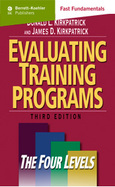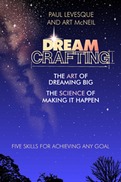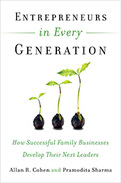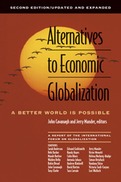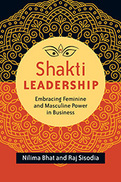Search Results: "building the future"
Results 1003-1008 of 1218
Dreamcrafting
2003
Many people set out to achieve a dream-starting a business or learning to play the piano or publishing a book-but they don't succeed, and the dream fizzles away. In many cases, these people have lots of skills and expertise, such as deep knowledge of the business or career they are interested in, so why don't they succeed? Paul Levesque and Art McNeil have discovered that making a dream come true requires cultivating skills of a higher order-macroskills-that inevitably spell the difference between success and failure no matter what the specifics of a person's dreams are. These are the skills Dreamcrafting outlines in detail.Many people set out to achieve a dream-starting a business or learning to play the piano or publishing a book-but they don't succeed, and the dream fizzles away. In many cases, these people have lots of skills and expertise, such as deep knowledge of the business or career they are interested in, so why don't they succeed? Paul Levesque and Art McNeil have discovered that making a dream come true requires cultivating skills of a higher order-macroskills-that inevitably spell the difference between success and failure no matter what the specifics of a person's dreams are. These are the skills Dreamcrafting outlines in detail.
Discover What Makes Family Businesses Beat the Odds and Thrive over Generations
Families are complicated; family businesses even more so. Like other companies, family-run enterprises must develop leadership and entrepreneurial skills. But they must also manage family dynamics that rarely mirror the best practices in the latest Harvard Business Review.
Allan Cohen and Pramodita Sharma, scholars with deep professional and personal roots in family businesses, show how enterprising families can transmit the hunger for excellence across generations. Using examples of firms that flourished and those that failed, they describe the practices that characterize entrepreneurial individuals, families, and organizations and offer pragmatic advice that can be tailored to your unique situation.
Families are complicated; family businesses even more so. Like other companies, family-run enterprises must develop leadership and entrepreneurial skills. But they must also manage family dynamics that rarely mirror the best practices in the latest Harvard Business Review.
Allan Cohen and Pramodita Sharma, scholars with deep professional and personal roots in family businesses, show how enterprising families can transmit the hunger for excellence across generations. Using examples of firms that flourished and those that failed, they describe the practices that characterize entrepreneurial individuals, families, and organizations and offer pragmatic advice that can be tailored to your unique situation.
The authors of the classic bestseller The Leadership Challenge bring their expertise to higher education, offering five practices that can make any college or university leader into an exemplary leader.
Drawing on the same pioneering research that formed the foundation of their classic bestseller The Leadership Challenge (over 2.7 million copies sold), James Kouzes and Barry Posner offer a set of leadership skills and practices that will make a significant difference in every area of higher education—faculty, administration, library services, career counseling, auxiliary services, campus safety, and more. It's about the behaviors that leaders, regardless of their position, use to transform values into actions, visions into realities, obstacles into innovations, segments into solidarity, and risks into rewards.
Kouzes and Posner tell the leadership story from the inside and move outward, describing it first as a personal journey and then as mobilizing others to want to do things they have never done before. The Five Practices of Exemplary Leadership is the operating system for this adventure. Leadership in Higher Education explains the fundamental principles that support these practices and provides case examples of people in higher education who demonstrate each one.
A core theme that weaves its way through all the chapters is that, whether it's one to one or one to many, leadership is a relationship between those who aspire to lead and those who choose to follow. We need leaders who can unite us and ignite us. This book lights the way.
Drawing on the same pioneering research that formed the foundation of their classic bestseller The Leadership Challenge (over 2.7 million copies sold), James Kouzes and Barry Posner offer a set of leadership skills and practices that will make a significant difference in every area of higher education—faculty, administration, library services, career counseling, auxiliary services, campus safety, and more. It's about the behaviors that leaders, regardless of their position, use to transform values into actions, visions into realities, obstacles into innovations, segments into solidarity, and risks into rewards.
Kouzes and Posner tell the leadership story from the inside and move outward, describing it first as a personal journey and then as mobilizing others to want to do things they have never done before. The Five Practices of Exemplary Leadership is the operating system for this adventure. Leadership in Higher Education explains the fundamental principles that support these practices and provides case examples of people in higher education who demonstrate each one.
A core theme that weaves its way through all the chapters is that, whether it's one to one or one to many, leadership is a relationship between those who aspire to lead and those who choose to follow. We need leaders who can unite us and ignite us. This book lights the way.
Written by a premier group of 21 thinkers from around the world, the second edition of Alternatives to Economic Globalization lays out democratic, ecologically sound, socially just alternatives to corporate globalization more fully, specifically, and thoughtfully than has ever been done before. Focusing on constructive, achievable goals, the authors present ten governing principles for establishing truly sustainable societies and describe alternatives to the World Bank, the IMF, and the WTO that would better serve the needs of the planet. They offer detailed proposals for protecting vital goods and services from corporate exploitation, limiting corporate privileges and power, rebuilding economies to make them more responsive to human needs, and more.
This revised and expanded edition features a new opening chapter on the global balance of power, a new section on the media and globalization, and a new final chapter on what ordinary citizens can do to fight the injustices of globalization. It also includes many new charts, sidebars, and other updated information.
This revised and expanded edition features a new opening chapter on the global balance of power, a new section on the media and globalization, and a new final chapter on what ordinary citizens can do to fight the injustices of globalization. It also includes many new charts, sidebars, and other updated information.
- The definitive document of the anti-corporate globalization movement-the consensus report of an alliance of leading activists, scholars, economists, researchers, and writers
- Offers a constructive, coherent, positive alternative to globalization-the very thing that the anti-corporate globalization movement is always accused of not putting forward
- The International Forum on Globalization consists of the leaders of over 60 organizations in 25 countries -including such prominent organizations as Friends of the Earth, the Third World Network, the Sierra Club, the Institute for Policy Studies, Public Citizen, Rainforest Action Network, and Food First
Shakti Leadership
2016
Unlocking the Source for True Leadership
Too many people, men and women alike, have bought into a notion of leadership that exclusively emphasizes traditionally “masculine” qualities: hierarchical, militaristic, win-at-all-costs. The result has been corruption, environmental degradation, social breakdown, stress, depression, and a host of other serious problems. Nilima Bhat and Raj Sisodia show us a more balanced way, an archetype of leadership that is generative, cooperative, creative, inclusive, and empathetic. While these are traditionally regarded as “feminine” qualities, we all have them. In the Indian yogic tradition they're symbolized by Shakti, the source that powers all life.
Through exercises and inspirational examples, Bhat and Sisodia show how to access this infinite energy and lead with your whole self. Male or female, leaders who understand and practice Shakti Leadership act from a consciousness of life-giving caring, creativity, and sustainability to achieve self-mastery internally and be of selfless service to the world.
Too many people, men and women alike, have bought into a notion of leadership that exclusively emphasizes traditionally “masculine” qualities: hierarchical, militaristic, win-at-all-costs. The result has been corruption, environmental degradation, social breakdown, stress, depression, and a host of other serious problems. Nilima Bhat and Raj Sisodia show us a more balanced way, an archetype of leadership that is generative, cooperative, creative, inclusive, and empathetic. While these are traditionally regarded as “feminine” qualities, we all have them. In the Indian yogic tradition they're symbolized by Shakti, the source that powers all life.
Through exercises and inspirational examples, Bhat and Sisodia show how to access this infinite energy and lead with your whole self. Male or female, leaders who understand and practice Shakti Leadership act from a consciousness of life-giving caring, creativity, and sustainability to achieve self-mastery internally and be of selfless service to the world.


